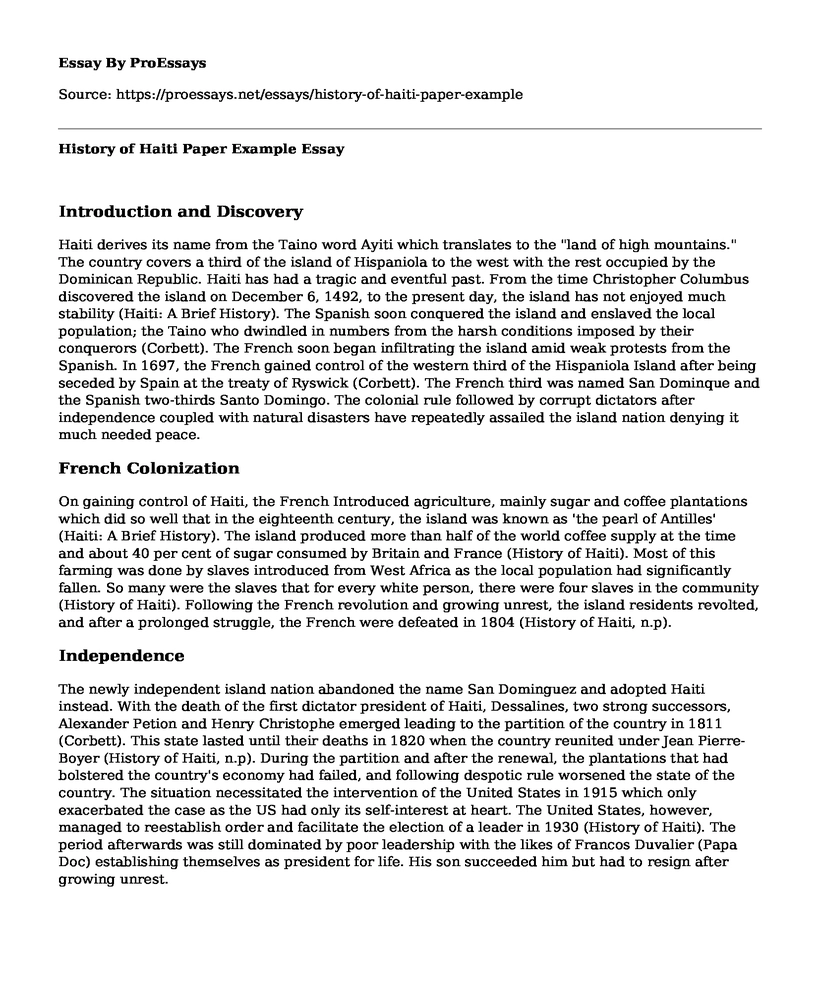Introduction and Discovery
Haiti derives its name from the Taino word Ayiti which translates to the "land of high mountains." The country covers a third of the island of Hispaniola to the west with the rest occupied by the Dominican Republic. Haiti has had a tragic and eventful past. From the time Christopher Columbus discovered the island on December 6, 1492, to the present day, the island has not enjoyed much stability (Haiti: A Brief History). The Spanish soon conquered the island and enslaved the local population; the Taino who dwindled in numbers from the harsh conditions imposed by their conquerors (Corbett). The French soon began infiltrating the island amid weak protests from the Spanish. In 1697, the French gained control of the western third of the Hispaniola Island after being seceded by Spain at the treaty of Ryswick (Corbett). The French third was named San Dominque and the Spanish two-thirds Santo Domingo. The colonial rule followed by corrupt dictators after independence coupled with natural disasters have repeatedly assailed the island nation denying it much needed peace.
French Colonization
On gaining control of Haiti, the French Introduced agriculture, mainly sugar and coffee plantations which did so well that in the eighteenth century, the island was known as 'the pearl of Antilles' (Haiti: A Brief History). The island produced more than half of the world coffee supply at the time and about 40 per cent of sugar consumed by Britain and France (History of Haiti). Most of this farming was done by slaves introduced from West Africa as the local population had significantly fallen. So many were the slaves that for every white person, there were four slaves in the community (History of Haiti). Following the French revolution and growing unrest, the island residents revolted, and after a prolonged struggle, the French were defeated in 1804 (History of Haiti, n.p).
Independence
The newly independent island nation abandoned the name San Dominguez and adopted Haiti instead. With the death of the first dictator president of Haiti, Dessalines, two strong successors, Alexander Petion and Henry Christophe emerged leading to the partition of the country in 1811 (Corbett). This state lasted until their deaths in 1820 when the country reunited under Jean Pierre-Boyer (History of Haiti, n.p). During the partition and after the renewal, the plantations that had bolstered the country's economy had failed, and following despotic rule worsened the state of the country. The situation necessitated the intervention of the United States in 1915 which only exacerbated the case as the US had only its self-interest at heart. The United States, however, managed to reestablish order and facilitate the election of a leader in 1930 (History of Haiti). The period afterwards was still dominated by poor leadership with the likes of Francos Duvalier (Papa Doc) establishing themselves as president for life. His son succeeded him but had to resign after growing unrest.
Democracy and New Challenges
In 1990, Haiti held a presidential election which was widely accepted to be free and fair. Jean-Bertrand Aristide came out the winner but was overthrown by the military after merely seven months. Interventions from the United Nations and the U.S saw the over-throwers step-down and Aristide reinstated in 1994. The same problems hounded Aristides' terms as president, and nothing changed for the country (Haiti, n.p). Preval succeeded Aristide in 2006 in a controversial election. On January 12, 2010, the country experienced its greatest natural disaster; an earthquake that killed around 300,000 and displaced millions. Haiti still suffers from violence, crime, and poor leadership.
Works Cited
Haiti: A Brief History of a Complex Nation. The University of Kansa
History of Haiti. Nations online. www.nationsonline.org/oneworld/History/Haiti-history.htm. Accessed 10 October 2018.
Cite this page
History of Haiti Paper Example. (2022, Sep 11). Retrieved from https://proessays.net/essays/history-of-haiti-paper-example
If you are the original author of this essay and no longer wish to have it published on the ProEssays website, please click below to request its removal:
- Comparative Analysis of American Indian History Essay
- WW1: US Emerges as Superpower After Global Conflict - Essay Sample
- Essay Example on U.S. Prisons Need a Change: Focus on Rehabilitation, Not Punishment
- Essay Example on Mystery of the Ancient Egyptian Pyramids: A Wonder of the Ages
- Colonists in America: Seeking Land, Riches and Religious Freedom - Essay Sample
- Ethnocentrism & Eugenics: 400BC to Present - Essay Sample
- Paper Example on Michael Ondaatje: Journey Through Mixed Cultures







